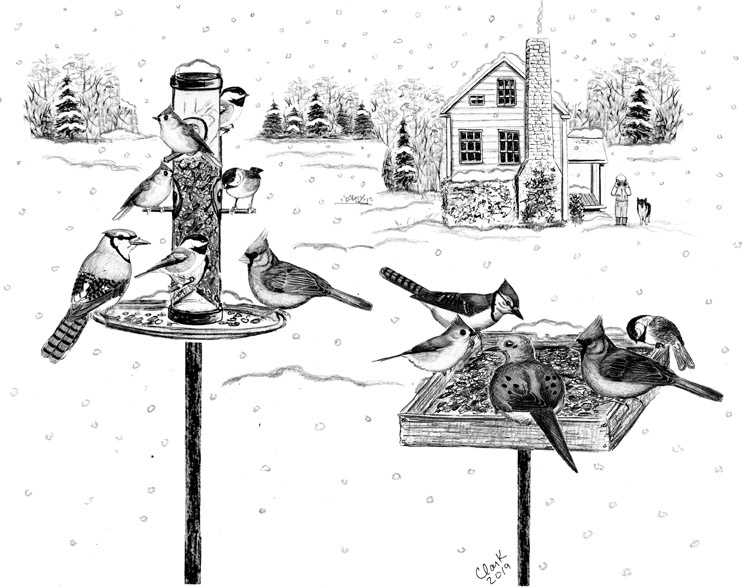
Dear Bird Folks,
I’ve been feeding birds in my yard for years, but my neighbor thinks it’s a bad idea. Is she right?
– Gwen, Sutton, MA
Not this again, Gwen,
In 2003, a mere 16 years ago, I wrote a column on this very topic. Only back then the voice of concern wasn’t a nosy neighbor, it was The Wall Street Journal. For some reason the Journal decided to write about feeding birds. One might ask: What does the Journal know about birds? As it turns out, not very much. The article raised a lot of questions, but provided very few answers. After I received your question, I almost resubmitted my answer from 2003, but that would have been lazy. Besides, I’m not going outside for a while. Why is that? Because it’s snowing, the wind chill is -17, and the way I feel right now, I’m not leaving the house until June 30th, at the earliest. Therefore, I might as well stay home, watch my feeders and answer your question. Sounds like a good way to spend a day.
One concern folks have with feeding birds is that the birds can become “dependent” on an artificial food supply. It’s the old “once you start feeding them, you can’t stop” myth. This is pretty silly when you think about it. If a robin lands on a berry bush and eats all the berries, it doesn’t die of starvation the minute the last berry is eaten. It simply moves on, in search of more berry bushes. In nature there is no infinite food supply and birds know it. When the food is gone, so are the birds.
Other people claim that birds will “forget” how to fend for themselves. That’s funny. By visiting a feeder, birds actually are fending for themselves. There isn’t a big difference between a goldfinch eating the weed seeds in a garden and the seeds in a feeder. In addition, studies have shown that only a small percentage of a backyard bird’s diet comes from feeders; most of what it eats is obtained from more natural sources.
Some officials are concerned that feeders can be a source of disease (to other birds, not to us). This concern is certainly legitimate. A sick bird could possibly infect others, which is why proper feeder maintenance is so important. An unhealthy bird will be sluggish and puffed out (sort of like me today). If you see a sick bird on your feeder, you should bring the feeder inside, give it a good cleaning and don’t put it back out until the sick bird moves on (one way or another). Also, never top off your bird feeders. Every bit of old seed needs to be shaken out before adding fresh seed, even if the “old” seed was added just a few days before. Old, wet seed becomes moldy fast. The same thing applies to a birdbath. Just because there’s water in it, doesn’t mean the water is good to drink. Because of all the berries birds eat in the winter, a birdbath can become disgusting very quickly. People are shocked when birds poop in their own water. Really? Have you ever seen what we dump into the ocean? And we know better.
In recent decades, some bird species (cardinals, titmice, Red-bellied Woodpeckers) have been expanding their range northward. The reasons for this expansion aren’t totally clear, but climate change and our introduced plants and gardens are likely factors, as well as our feeders. Everything we do affects birds, whether it’s intentional or not. But I would argue that feeders benefit all birds, not just the ones in our backyard. Let me explain.
Based solely on my own experience, I find folks who feed birds are more environmentally concerned. They tend to support open space, use their own shopping bags and keep their cats (if they have them) inside. Keeping a cat indoors not only makes things safer for birds, but it keeps the family pet from becoming food for coyotes and fishers. But I think I know the main reason why my customers keep their cats inside. They don’t want to endure another lecture about it from me. Nobody wants that.
Some people might ask: What do we gain by attracting birds? Why spend all the money? Ask that question to the little girl who has just seen her first hummingbird eating from her parents’ feeder, or the retiree who wakes up one morning and finds a flock of bluebirds in his birdbath. There’s something magical about experiencing nature up close and in your own yard. Today might be the coldest day on Cape Cod since the last ice age. On three sides of my house things are bleak and lifeless, but on the side where the feeders are it’s like an avian train station. The chickadees are chasing each other, the jays are screaming about something, robins are gobbling water out of the birdbath and the cardinals are just looking pretty…and I can’t stop watching. Appreciating birds is one of those things that if it has to be explained, you aren’t going to get it.
I realize, Gwen, that asking me if you should feed birds is like asking Papa Gino if you should eat pizza or Mrs. Fields if you should snack on cookies. What do you think we’re going to say? (In case you’re not sure, the answers to those questions are yes, yes and yes, in that order.) But I’m not alone here. Many organizations, including Cornell University and the National Audubon Society, also support bird feeding, as long as it is done properly. Tell your neighbor that I said feeding birds is okay. If she still isn’t satisfied, have her put down her Wall Street Journal and come see me. I’ll be glad to have a chat with her about it…but not until June 30th, at the earliest.